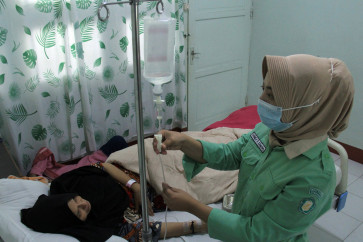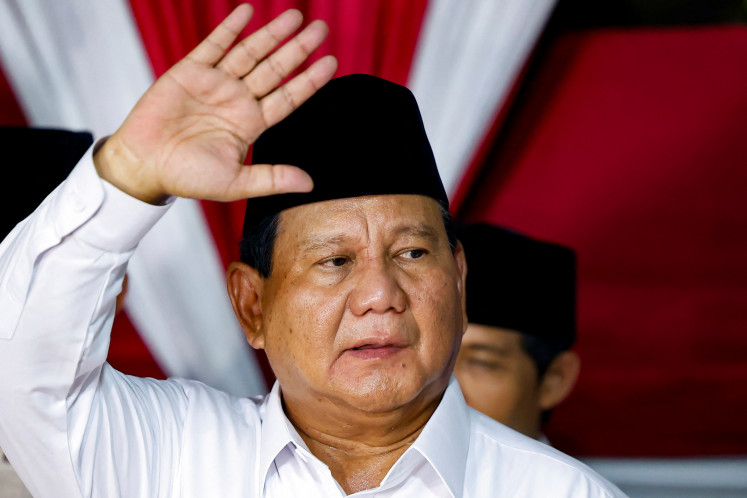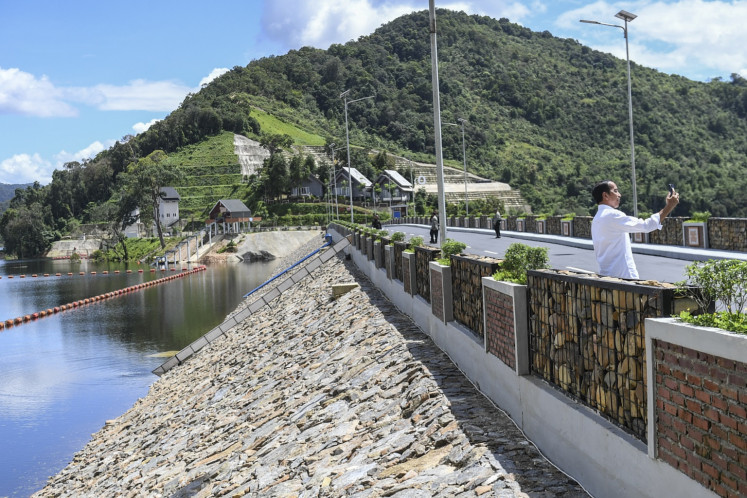Bioprospecting: biodiversity at a crossroads
“Preserving our plants and wildlife for the sustainability of life” is the theme that the Environment Ministry has declared for this year’s National Love for Plants and Wildlife Day, which is celebrated every Nov
Change Size

“Preserving our plants and wildlife for the sustainability of life” is the theme that the Environment Ministry has declared for this year’s National Love for Plants and Wildlife Day, which is celebrated every Nov. 5.
Having a day dedicated to Indonesia’s rich biodiversity is intended to gear public awareness toward the importance of caring for our natural heritage, so that it may bring continuous benefits for future generations to come.
On an international level, Indonesia signed the Nagoya Protocol on Access and Benefit Sharing earlier this year.
The Nagoya Protocol is an international treaty under the Convention on Biological Diversity (CBD) that agrees on fair and equitable sharing from the utilization of genetic resources found in certain countries.
The protocol stipulates that those who produce genetic resources must provide benefit sharing with the country of origin of that particular genetic resource.
Benefit sharing may take the shape of funding, technology transfers or capacity building, depending on what is agreed bilaterally between the user and provider.
With more than 60 signatories, the Nagoya Protocol has now entered into force.
Of course, most signatories come from developing and resource-rich countries, and countries from the European Union, but the protocol is still missing major genetic resource users, such as the United States and Australia, from its signatory list.
The Nagoya Protocol is a sup-plementary agreement to the Convention on Biological Diversity (CBD), a convention signed during the 1992 Earth Summit in Rio de Janeiro.
In December 1993, the CBD entered into force without the participation of the US.
During negotiations, developed and developing countries held contradictory objectives.
While developing countries wanted a protection of rights to benefit from biodiversity within their own territories and also protection from multinational companies and industrialized states, developed countries aimed to increase their level of access to the world’s genetic materials, most of which are located in developing countries, by arguing that “biodiversity is the common heritage of humankind.”
And so the convention was created with three objectives: conservation of biodiversity, sustainable use of biological resources, and the “fair and equitable sharing” of the benefits from using genetic resources.
After many long years of negotiations, the CBD produced two supplementary agreements: the Cartagena Protocol on Biosafety in 2000, to ensure the safe-handling of living modified organisms, and more recently, the Nagoya Protocol on Access and Benefit Sharing, for the world’s genetic wealth.
These agreements represent an internationally agreed umbrella framework for us to intensify our national conservation efforts, but they could also easily backfire if we fail to bioprospect our genetic
resources.
For Indonesia, signing the Nagoya Protocol provides a blessing if we can list down, catalog, and patent all of our native endemic species throughout the archipelago.
But if we fail to do this ahead of other countries, we will end up going downhill, paying royalties for what really originates from our own soil and seas.
Coffee, sugarcane, and palm oil are among some of the products that we might have to pay higher prices for in the future because the genetic resources of these products are claimed to originate from Brazil or South Africa and were only brought to Indonesia by the Dutch.
This presents a threat to our people, our national businesses and the country as a whole, but many people are still unaware of it.
As the world’s second megabiodiversity country, it is time that Indonesia resets its priorities to put the best interests of its natural resources first.
A three-pronged strategy is needed to achieve this, covering local, national and international dimensions.
First, on a national level the government needs to realize the urgency of bioprospecting and allocate a sufficient budget for this purpose.
Bioprospecting means identifying valuable components and genetic resources in fields such as horticulture, medicine, pharmaceuticals, cosmetics, and food and beverages.
But not only that, bioprospecting also involves creating a legal framework for compensation when materials and indigenous knowledge are shared with external parties.
Bioprospecting is needed to prevent actions of biopiracy or incidents where Indonesian genetic materials are “stolen” and stored in foreign banks for commercial purposes.
Biopiracy on Indonesian genetic materials has been a source of many biotechnology patents on a global level without ample economic returns to our country.
Second, this country must safeguard its genetic wealth by integrating a local approach within its national strategy. We need to actively involve local communities in the bioprospecting process.
They are essentially the owners of these genetic resources and traditional knowledge. It is the local wisdom that is passed on for many generations that we need preserve and attribute the highest value to, and ensure that they receive equitable benefits, too.
The Environment Ministry has set up biodiversity centers in several provinces to identify and list down our endemic genetic resources. Coordinated bioprospecting efforts are also undertaken together with the Forestry Ministry, Agriculture Ministry and the Indonesian Institute of Science (LIPI).
But without the help of local tribes and communities, it will be near impossible to document all of the genetic resources and indigenous knowledge throughout this vast archipelago.
One successful effort in a developing country to prevent biopiracy is India’s Traditional Knowledge Digital Library (TKDL), a database documenting traditional medicinal treatment that integrates diverse disciplines (Ayurveda, Unani and Siddha), various traditional languages (Sanskrit, Hindi, Arabic, Urdu, Persian, and Tamil), as well as modern science and modern medicine.
The ancient texts of 34 million pages in the TKDL are made available in English, Japanese, French, German and Spanish.
Third, on an international level we need to honor our international obligations and encourage other countries to respect multilateralism and do the same.
It is common knowledge that however ideal international agreements may be, they remain non-enforceable. If a country decides not to join a particular agreement, then it can do so; and if a country party to an agreement does not fulfill its obligations accordingly, there is not much that other countries can do about it.
To achieve the global goals for conserving biodiversity for sustainable use, we need to strengthen and respect the existing agreements by honoring our international obligations and encouraging other countries to do the same.
We have one year before the CBD Conference of Parties meeting in Hyderabad, which will discuss, among other things, the implementation of the Nagoya Protocol and the integration of biodiversity values in national planning and accounting processes.
If Indonesia fails in its bioprospecting efforts and biodiversity diplomacy, then soon there will not be many more plants or wildlife for our children to preserve and love as their own.
The writer is a lecturer of Global Environmental Institutions at the Department of International Relations, University of Indonesia, Depok, West Java.









